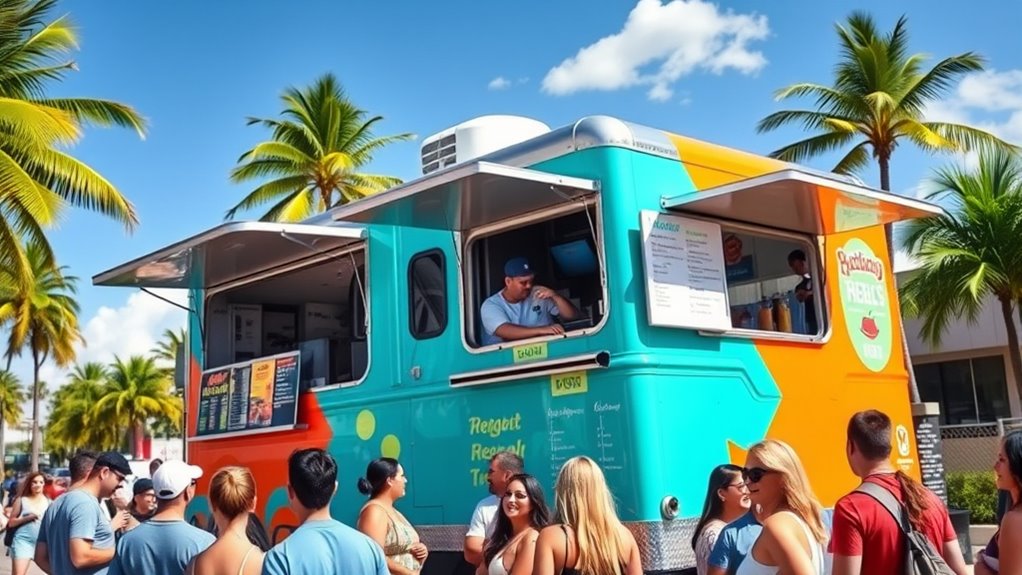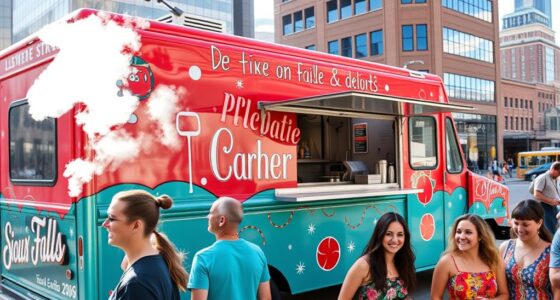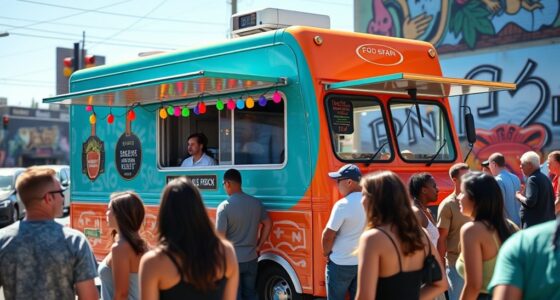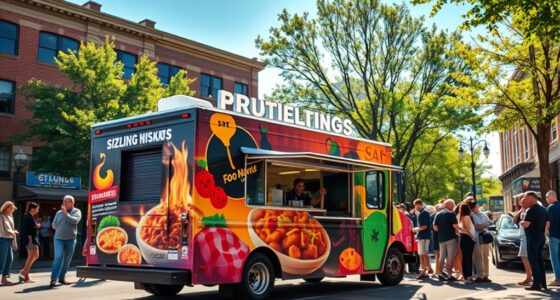To start a food truck in Fort Lauderdale, you need to secure the necessary permits, including health and parking permits, by applying through local online portals. Plan your budget for vehicle, equipment, and permits, and consider obtaining insurance for liability coverage. Develop a menu with competitive pricing, incorporating technology like mobile POS for sales. Focus on branding and marketing to attract customers, and explore local spots and events to grow your presence. Continue exploring to learn detailed steps for launching your food truck successfully.
Key Takeaways
- Research and obtain necessary permits and licenses via Fort Lauderdale’s online permit portals.
- Budget for startup costs, including vehicle purchase, equipment, insurance, and permits.
- Develop a menu with competitive pricing, sourcing local ingredients, and integrating contactless payment technology.
- Choose compliant parking zones, identify shared kitchens, and follow sanitation and safety regulations.
- Build strong branding, utilize social media marketing, and engage with the local community to attract customers.
Starting a Food Truck Journey

Starting a food truck journey can be both exciting and challenging. To set yourself apart, focus on strong food truck branding that reflects your unique style and menu. A memorable brand helps attract attention and makes it easier for customers to recognize your truck. Building customer loyalty is essential for long-term success, so prioritize excellent service and quality food. Engage with your community by sharing your story and creating a welcoming atmosphere. Consistency in branding and customer experience will encourage repeat visits and positive word-of-mouth. Remember, your brand is your reputation, so invest time in developing it from the start. Incorporating curiosity into your approach can inspire you to explore new ideas and connect more deeply with your audience. With clear branding and a focus on customer loyalty, you’ll be well on your way to establishing a thriving food truck in Fort Lauderdale.
Understanding Local Requirements

To operate legally, you need to understand Fort Lauderdale’s online permit application portals and how to navigate them. You’ll also have to follow sanitation protocols and keep detailed records to stay compliant. Additionally, make sure you park only in designated street zones to avoid fines or shutdowns. Using proper skincare practices, such as applying eye patches correctly, can also help maintain your appearance and boost your confidence as you run your food truck business.
Online Permit Application Portals
Finding your way through the online permit application portals in Fort Lauderdale is a essential step in launching your food truck. The city’s digital licensing system streamlines the process, allowing you to apply for various permits from home. You’ll need to access the online permit portal to submit your application, pay fees, and track your progress. Familiarize yourself with the specific requirements for mobile food vendors, including necessary documentation and licenses. The digital licensing platform is user-friendly, guiding you through each step. Make sure your permits are complete and approved before moving forward. Using these portals saves time and helps you stay organized, ensuring you meet all local requirements efficiently. Stay proactive and double-check each submission to avoid delays.
Sanitation Protocols and Record-Keeping
Understanding local sanitation protocols is vital for guaranteeing your food truck meets Fort Lauderdale’s health standards. You need to install proper handwashing stations to promote hygiene and prevent contamination. Regular sanitation training for your staff is essential to make certain everyone follows proper cleaning procedures and understands local requirements. Keep detailed records of daily cleaning schedules, temperature logs, and sanitation procedures, as these may be inspected by health authorities. Maintaining accurate records helps demonstrate compliance and quickly addresses any issues. Make sure your sanitation practices adhere to Fort Lauderdale’s regulations, including proper waste disposal and equipment sanitation. Staying diligent with these protocols protects your customers and keeps your food truck operating smoothly within the health department’s guidelines.
Designated Street Parking Zones
Knowing where you can park your food truck is essential for compliance and smooth operation in Fort Lauderdale. Local authorities designate specific street parking zones where food trucks are allowed, and understanding these areas helps you avoid fines or citations. Fort Lauderdale’s street regulations specify parking zone restrictions, including time limits and permit requirements. Be sure to review signage and markings to identify authorized parking zones. Some areas may require a special permit or reservation, so always verify with city officials before parking. Staying within designated street parking zones ensures you operate legally and avoid conflicts with other street users. Familiarizing yourself with these parking regulations helps you plan your routes and locations efficiently, keeping your business compliant and running smoothly.
Setting Up Your Base of Operations
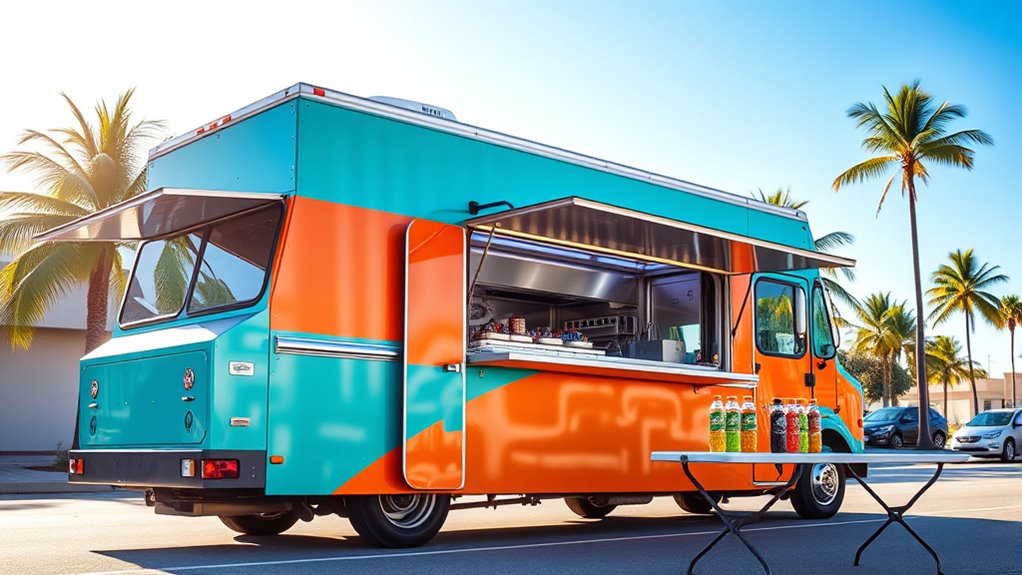
When setting up your base of operations, you need to understand shared kitchen licensing rules in Fort Lauderdale to stay compliant. Choosing the right custom kitchen equipment is essential for efficiency and meeting health standards. Make sure your setup aligns with local regulations to keep your food truck running smoothly. Incorporating appropriate kitchen safety protocols ensures a secure environment for food preparation.
Shared Kitchen Licensing Rules
Setting up your food truck in Fort Lauderdale often involves using shared kitchens, which require specific licensing to operate legally. These shared kitchen licensing rules ensure your operation complies with local health and safety standards. To get started, you need to:
- Verify that the shared kitchen is properly licensed by local health authorities.
- Obtain the necessary permits for commercial food production.
- Confirm your food handling practices meet state and city regulations.
- Keep documentation of inspections and licenses on-site for compliance.
Understanding these shared kitchen licensing rules helps you avoid fines or shutdowns. It’s vital to work closely with local agencies to confirm your shared kitchen setup aligns with legal requirements. Proper licensing safeguards your business and ensures smooth operations.
Custom Kitchen Equipment Selection
Choosing the right custom kitchen equipment is essential to establishing a functional and efficient food truck. Your equipment selection impacts your workflow, safety, and food quality. Begin by evaluating your menu to determine what appliances and tools are necessary, such as grills, fryers, or refrigeration units. Invest in durable, space-saving equipment designed for mobile use to maximize limited space. Consider energy efficiency to reduce operational costs and ensure compliance with local regulations. Prioritize safety features like non-slip surfaces and proper ventilation. Custom kitchen design should facilitate smooth movement and quick service. Remember, well-chosen equipment not only boosts productivity but also enhances your truck’s reliability. Carefully selecting your custom kitchen ensures you’re prepared to serve delicious food while operating smoothly on the go.
Budgeting and Financing Your Food Truck
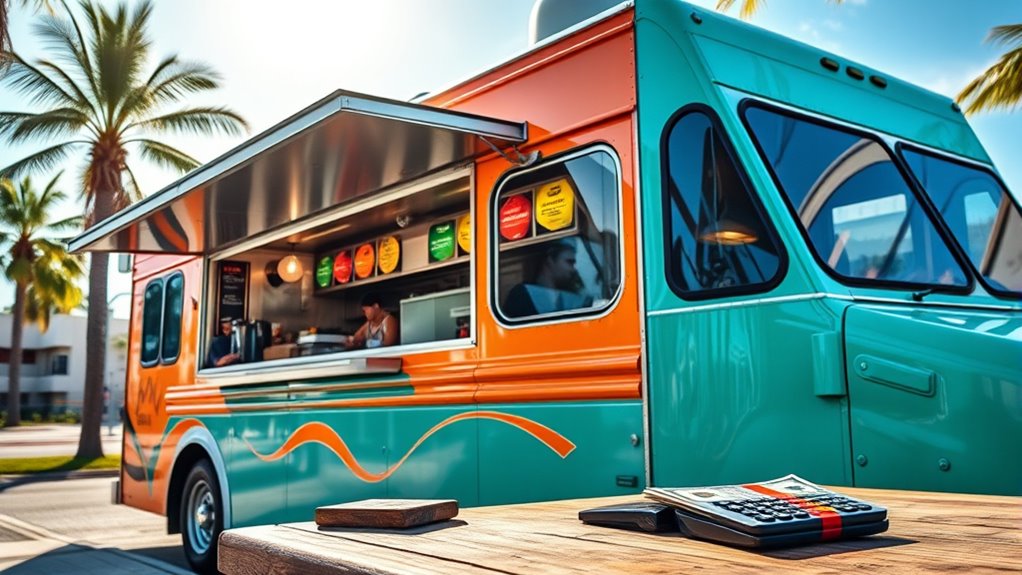
When budgeting for your food truck, you’ll need to factor in initial vehicle customization costs to make it menu-ready. You should also explore local small business grants that can help fund your startup, and don’t forget to include liability coverage to protect your investment. Proper planning ensures you stay financially prepared as you launch your food truck in Fort Lauderdale. Additionally, researching grocery savings strategies can help you reduce operating costs in the long run.
Initial Vehicle Customization Costs
Customizing your food truck is a significant investment that requires careful budgeting, as initial vehicle modification costs can vary widely. You’ll need to consider essential upgrades to make your truck functional and eye-catching.
- Vehicle wrap: A vibrant vehicle wrap can cost between $2,500 and $5,000, helping your truck stand out on the streets.
- Custom paint: If you prefer a unique look, custom paint jobs range from $3,000 to $7,000, adding personality to your brand.
- Equipment installation: Outfitting your truck with kitchen appliances and shelving can range from $10,000 to $30,000, depending on needs.
- Permits and inspections: Don’t forget to budget around $1,000 to $3,000 for necessary permits and safety inspections.
These costs are essential for transforming a basic vehicle into a profitable food truck.
Local Small Business Grants
Are you aware that local small business grants can provide essential funding to help cover your food truck’s startup costs? These grants often have specific grants eligibility criteria, so it’s *vital* to review what is required before applying. Many grants target new entrepreneurs or small businesses in Fort Lauderdale, making them a valuable resource. To increase your chances, prepare a strong funding application that clearly outlines your business plan, financial needs, and community impact. Keep in mind that grants don’t need repayment, but the application process can be competitive. Research local government programs, economic development agencies, and community foundations offering grants for small businesses. Securing this funding can *considerably* reduce your initial financial burden and set a solid foundation for your food truck’s success.
Liability Coverage for Food Trucks
Securing proper liability coverage is a key step in budgeting and financing your food truck venture. Insurance requirements vary, but liability coverage is essential to protect you from potential claims. Without it, a single accident could jeopardize your entire operation. Consider these points:
- Understand local insurance requirements for food trucks in Fort Lauderdale.
- Budget for extensive liability coverage to cover damages or injuries.
- Shop around for policies that balance cost with adequate coverage.
- Remember, liability coverage isn’t just a legal requirement; it’s a safeguard for your business’s future.
Getting the right insurance ensures you meet legal standards and shields your investment. Prioritize liability coverage to confidently handle unexpected incidents and keep your food truck running smoothly.
Designing Your Menu and Pricing Strategy

When designing your menu, focus on sourcing ingredients locally to keep costs down and guarantee freshness. Calculating the cost per plate helps you set prices that cover expenses and attract customers. Balancing quality and affordability is key to creating a successful pricing strategy. Incorporating nutrient-rich ingredients like beets can also appeal to health-conscious customers and differentiate your offerings.
Locally Sourced Ingredient Selection
Choosing locally sourced ingredients can considerably elevate your menu and influence your pricing strategy. When sourcing vendors, prioritize those who provide fresh, seasonal produce to guarantee ingredient freshness. This approach not only enhances flavor but also builds a reputation for quality. Consider these key points:
- Establish relationships with nearby farmers and markets to secure reliable sourcing vendors.
- Emphasize ingredient freshness on your menu to attract health-conscious customers.
- Adjust your pricing to reflect the quality and authenticity of locally sourced ingredients.
- Incorporate seasonal items to keep your menu dynamic and cost-effective.
Cost per Plate Calculation
Calculating the cost per plate is an essential step in designing a menu that balances quality with profitability. You need to conduct a thorough cost analysis to determine how much each dish costs to prepare, including ingredients, labor, and overhead. This helps you set realistic menu pricing that covers expenses and guarantees a profit margin. Start by adding up the cost of all ingredients for a single serving, then factor in labor and operational costs. Divide the total costs by the number of servings to find your cost per plate. With this data, you can adjust portion sizes or ingredient choices to optimize profitability. Accurate cost analysis empowers you to price your menu competitively while maintaining quality, vital for long-term success in the food truck business.
Technology and Operations
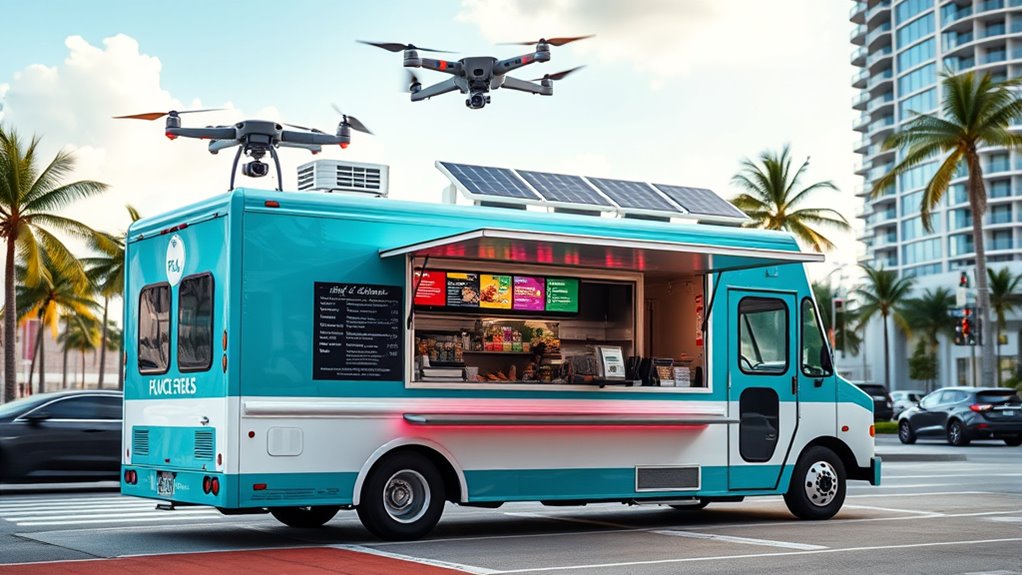
Implementing contactless payment options makes transactions faster and safer for your customers. Using a mobile POS system helps you manage orders and sales on the go, keeping operations smooth. Stock tracking tools guarantee you stay on top of inventory, so nothing runs out unexpectedly.
Contactless Payment Options Available
To enhance convenience and speed, the food truck in Fort Lauderdale offers contactless payment options that streamline transactions. By using contactless payments, you can pay quickly without cash or card swipes, reducing wait times. These digital transactions are secure, thanks to encryption and tokenization, ensuring your data stays protected. Consider these key benefits:
- Faster checkout process, increasing customer satisfaction
- Reduced contact, promoting safety during health concerns
- Enhanced digital transaction security with encryption
- Greater convenience using smartphones or contactless cards
Implementing contactless payments makes your food truck more efficient and appealing, encouraging repeat business. Customers appreciate the seamless experience, which helps you stand out in a competitive market.
Mobile POS and Stock Tracking
Mobile POS systems and stock tracking tools are essential for streamlining operations at your food truck. They help you manage sales efficiently, ensuring smooth transactions and improving cash flow. With a reliable POS, you can quickly process orders, accept multiple payment types, and track sales data in real time. Stock tracking tools provide accurate inventory management, alerting you when supplies run low and reducing waste. By integrating these systems, you gain better control over your inventory and cash flow, which is crucial for profitable operations. Additionally, these tools allow you to analyze sales trends, optimize menu offerings, and make informed decisions. Overall, investing in mobile POS and stock tracking technology simplifies daily operations and boosts your food truck’s efficiency and profitability.
Marketing and Growing Your Presence
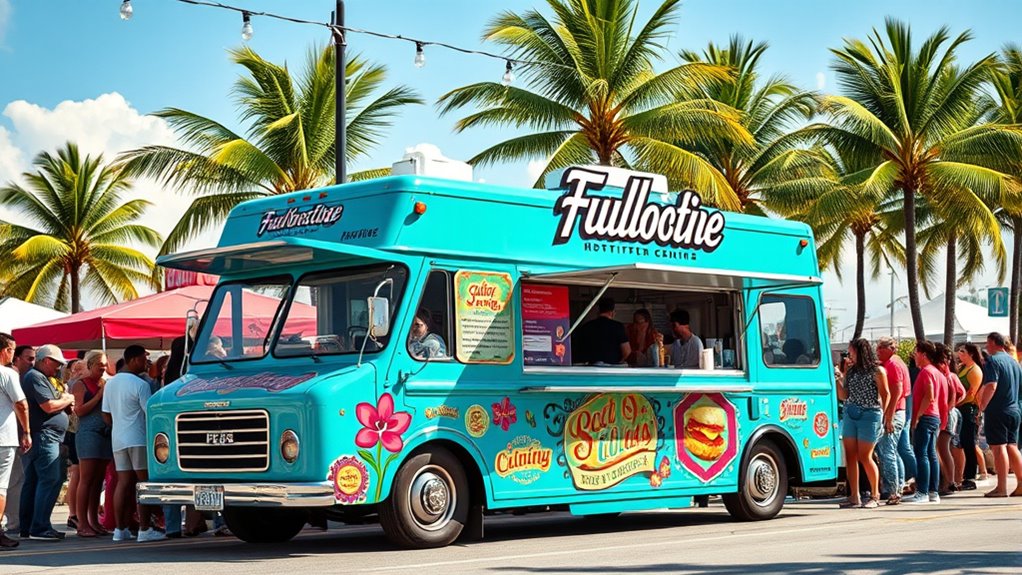
To boost your food truck’s visibility, focus on popular local event locations where crowds gather. Posting engaging Instagram photos of your dishes can attract foodies and encourage shares. These strategies help grow your presence and bring more customers to your truck.
Popular Local Event Locations
Strategically choosing popular local event locations can substantially boost your food truck’s visibility and customer base in Fort Lauderdale. Attending events like local food festivals exposes you to large crowds enthusiastic to try new eats, while neighborhood partnerships foster ongoing community support. To maximize impact, consider these key locations:
- Local food festivals – great for high foot traffic and brand exposure
- Community markets – build relationships and a loyal customer base
- Park events and outdoor concerts – attract diverse audiences
- Neighborhood partnerships – collaborate with local businesses for recurring opportunities
Engaging Instagram Foodie Photos
Capturing eye-catching and mouthwatering photos is essential for growing your food truck’s presence on Instagram. High-quality food photography highlights your dishes’ colors, textures, and presentation, making followers crave your offerings. Use natural light and appealing backgrounds to create vibrant images that stand out. Incorporate close-ups to showcase details and variety, enticing viewers to visit your truck. Consistent posting with engaging captions encourages Instagram engagement, helping your account grow organically. Don’t forget to use popular local hashtags and geotags to reach nearby food lovers. Respond to comments and interact with followers to build community and loyalty. With compelling visuals and active engagement, your food truck can attract more customers and become a favorite spot in Fort Lauderdale.
Navigating Fort Lauderdale’s Food Scene

Exploring Fort Lauderdale’s vibrant food scene is an exciting journey that offers a diverse array of flavors and dining experiences. To succeed, focus on your food truck aesthetics, making your vehicle inviting and memorable. Engage customers actively by sharing your story and menu through social media and in person. Here are four ways to navigate the scene effectively:
- Observe local competitors to identify gaps and opportunities.
- Build relationships with event organizers to secure spots at popular festivals.
- Use eye-catching visuals to attract attention, emphasizing your food truck’s unique style.
- Prioritize customer engagement by offering samples, asking for feedback, and creating a friendly atmosphere.
Mastering these elements helps you stand out and thrive in Fort Lauderdale’s dynamic food environment.
Frequently Asked Questions
What Permits Are Specific to Mobile Food Vendors in Fort Lauderdale?
To operate your food truck in Fort Lauderdale, you need to secure specific permits for mobile vendors. You must obtain a food truck permit and mobile vendor licensing from the city’s health department. Additionally, you’ll need a business tax receipt and possibly a parking or special event permit, depending on where you plan to park. Ensuring you have these permits in place helps you stay compliant and legally serve your customers.
How Can I Find the Best Locations for Food Truck Parking?
Finding ideal spots involves a bit of insight. You should explore parking lot permits and street corner regulations, which guide where you can set up comfortably. Look for busy areas with high foot traffic, like near parks or events, but always double-check local rules. Talk to property owners or city officials to verify your location is approved. Flexibility and knowledge will help you discover the perfect, profitable spots for your food truck.
Are There Any Local Food Safety Regulations Unique to Fort Lauderdale?
Yes, Fort Lauderdale has specific food safety regulations for food trucks. You need to pass a health inspection that covers proper food handling, sanitation, and storage. The local health department enforces these rules to guarantee safe food practices. Make sure you understand and comply with these regulations before launching your truck. Regular inspections are required, so prioritize maintaining high standards for food handling to avoid penalties and keep your customers safe.
What Insurance Coverage Is Required for Food Trucks in the Area?
You need liability insurance and vehicle coverage to operate a food truck in Fort Lauderdale. Liability insurance protects you against claims from customers or the public, while vehicle coverage guarantees your truck is protected from accidents or theft. The local regulations require you to carry these insurances before obtaining permits. Make sure you select policies that meet Florida’s specific standards, so your food truck stays compliant and protected on the road.
How Do I Connect With Local Food Truck Associations or Networks?
You can connect with local food truck associations or networks by attending food truck meetups and vendor networking events in Fort Lauderdale. These gatherings offer great opportunities to meet fellow vendors, share tips, and build relationships. Check social media groups, community boards, or websites dedicated to South Florida food trucks for event listings. Joining these networks helps you stay informed about industry news and collaboration opportunities, boosting your food truck’s success.
Conclusion
Starting your food truck journey is like planting a seed in Fort Lauderdale’s vibrant garden. With each step—understanding rules, crafting your menu, and building your brand—you nurture growth. Stay adaptable and patient, as your truck blossoms amidst the city’s bustling food scene. Like a gardener tending to delicate blooms, your dedication will turn this venture into a thriving oasis of flavors and community. Keep cultivating your passion, and watch your food truck flourish.
